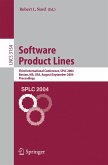While standardization has empowered the software industry to substantially scale software development and to provide affordable software to a broad market, it often does not address smaller market segments, nor the needs and wishes of individual customers. Software product lines reconcile mass production and standardization with mass customization in software engineering. Ideally, based on a set of reusable parts, a software manufacturer can generate a software product based on the requirements of its customer. The concept of features is central to achieving this level of automation, because features bridge the gap between the requirements the customer has and the functionality a product provides. Thus features are a central concept in all phases of product-line development.
The authors take a developer's viewpoint, focus on the development, maintenance, and implementation of product-line variability, and especially concentrate on automated product derivationbased on a user's feature selection. The book consists of three parts. Part I provides a general introduction to feature-oriented software product lines, describing the product-line approach and introducing the product-line development process with its two elements of domain and application engineering. The pivotal part II covers a wide variety of implementation techniques including design patterns, frameworks, components, feature-oriented programming, and aspect-oriented programming, as well as tool-based approaches including preprocessors, build systems, version-control systems, and virtual separation of concerns. Finally, part III is devoted to advanced topics related to feature-oriented product lines like refactoring, feature interaction, and analysis tools specific to product lines. In addition, an appendix listsvarious helpful tools for software product-line development, along with a description of how they relate to the topics covered in this book.
To tie the book together, the authors use two running examples that are well documented in the product-line literature: data management for embedded systems, and variations of graph data structures. They start every chapter by explicitly stating the respective learning goals and finish it with a set of exercises; additional teaching material is also available online. All these features make the book ideally suited for teaching - both for academic classes and for professionals interested in self-study.
The authors take a developer's viewpoint, focus on the development, maintenance, and implementation of product-line variability, and especially concentrate on automated product derivationbased on a user's feature selection. The book consists of three parts. Part I provides a general introduction to feature-oriented software product lines, describing the product-line approach and introducing the product-line development process with its two elements of domain and application engineering. The pivotal part II covers a wide variety of implementation techniques including design patterns, frameworks, components, feature-oriented programming, and aspect-oriented programming, as well as tool-based approaches including preprocessors, build systems, version-control systems, and virtual separation of concerns. Finally, part III is devoted to advanced topics related to feature-oriented product lines like refactoring, feature interaction, and analysis tools specific to product lines. In addition, an appendix listsvarious helpful tools for software product-line development, along with a description of how they relate to the topics covered in this book.
To tie the book together, the authors use two running examples that are well documented in the product-line literature: data management for embedded systems, and variations of graph data structures. They start every chapter by explicitly stating the respective learning goals and finish it with a set of exercises; additional teaching material is also available online. All these features make the book ideally suited for teaching - both for academic classes and for professionals interested in self-study.
"The book provides a systematic introduction to feature-oriented software product lines, and leads the reader to more advanced topics in its second half. The authors distill the concepts and principles underlying the field with remarkable clarity, providing a much-needed foundation for the field. They also illustrate these concepts and principles using concrete examples, showcasing
languages, tools, and systems from both industrial practice and latest research. (...) There is no better team than these four authors to write about feature-oriented software product lines. The authors have made fundamental scientific and engineering contributions to the field." from the foreword by Krzysztof Czarnecki, University of Waterloo, Canada
languages, tools, and systems from both industrial practice and latest research. (...) There is no better team than these four authors to write about feature-oriented software product lines. The authors have made fundamental scientific and engineering contributions to the field." from the foreword by Krzysztof Czarnecki, University of Waterloo, Canada
"The book provides a systematic introduction to feature-oriented software product lines, and leads the reader to more advanced topics in its second half. The authors distill the concepts and principles underlying the field with remarkable clarity, providing a much-needed foundation for the field. They also illustrate these concepts and principles using concrete examples, showcasing languages, tools, and systems from both industrial practice and latest research. (...) There is no better team than these four authors to write about feature-oriented software product lines. The authors have made fundamental scientific and engineering contributions to the field." from the foreword by Krzysztof Czarnecki, University of Waterloo, Canada








